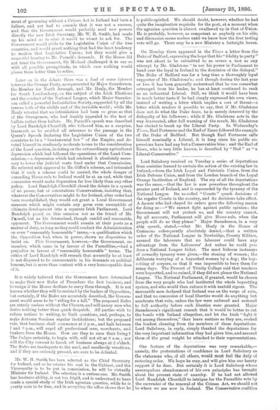Later on in the debate there was a duel of
some interest between the Orange Party, as represented by Major Saunderson, the Member for North Armagh, and Mr. Healy, the Member for South Londonderry, on the subject of the Irish Elections and the conduct of the National League, which Major Saunder- son called a powerful Intimidation Society, supported by all the terrors both of the visible and of the invisible world ; while Mr. Healy retorted that no intimidation had been so gross as that of the Orangemen, who had frankly appealed to the test of bullets rather than ballots. Mr. Parnell's speech was described by Lord Randolph Churchill, who followed him, as a surprise, inasmuch as be avoided all reference to the passage in the Queen's Speech declaring the Legislative Union of the two countries to be a "fundamental law " of the Empire, and de- voted himself in studiously moderate terms to the consideration of the Land question, insisting on the extraordinary agricultural depression which had followed the operations of the Land Com- mission,—a depression which had rendered it absolutely neces- sary to lower the judicial rents fixed under that Commission. He referred with approval to Mr. Giffen's scheme, and intimated that if such a scheme could be carried, the whole danger of conceding Home-rule to Ireland would be at an end, while that concession would make Separation far less likely than any other policy. Lord Randolph Churchill closed the debate in a speech of no power, but of ostentatious Conservatism, insisting that, whatever the Conservatives might do for Ireland, after order had been re-established, they would not grant a Local Government measure which might contain any germ even susceptible of ultimate development into a separate Irish Parliament. Lord Randolph posed on this occasion not as the friend of Mr. Parnell, but as his determined, though candid and reasonable, opponent. The Government would remain at their posts as a matter of duty, so long as they could conduct the Administration on even "reasonably honourable" terms,—a qualification which the Opposition had, when in power, shown no disposition to insist on. This Government, however,—the Government, re- member, which came in by favour of the Parnellites,—had a prejudice in favour of "reasonably honourable" terms. The critics of Lord Randolph will remark that assuredly he at least is not disposed to be unreasonable in his demands on political honour, but is more than content with a very homoeopathic dose of it.


































 Previous page
Previous page